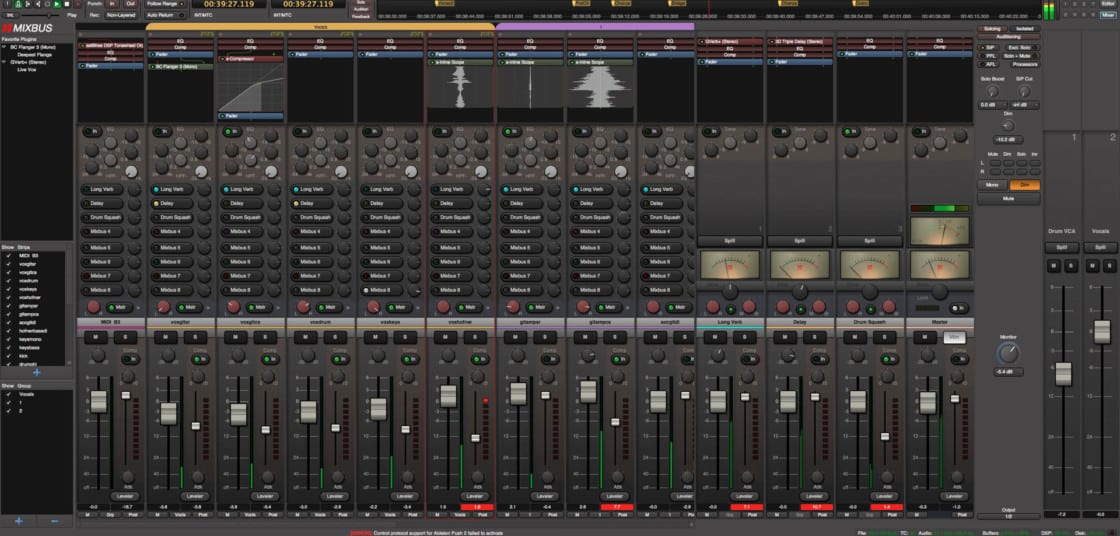Our friends at Harrison Consoles are offering an exclusive 50% OFF discount on Mixbus 4 (only €35,79 instead of €72,49) for all BPB readers, this June only!
Mixbus 4 (here’s our in-depth review) is an audio workstation focused on recreating the sound and workflow of analog mixing consoles. In fact, its built-in mixer is a faithful recreation of Harrison’s large-format consoles and their channel EQs, filters, compressors, metering, and other neat features. What’s so great about having these tools available on every audio channel in your virtual mixer is that mixing becomes a much more streamlined process which allows you to focus on shaping the sound instead of picking the right tools for the task.
See also: Harrison Mixbus 4 ReviewApart from the fully-featured channel strip, Mixbus 4 also emulates the analog summing you’d get if mixing down to a hardware console, as well as (optional) tape saturation to further sweeten the sound where needed. Of course, Harrison Consoles has also included the modern features you’d expect to get in a digital audio workstation. Mixbus 4 offers a beautifully designed “one knob per function” mixer layout, high-precision DSP algorithms, detailed undo/redo and history (even after closing a session), multi-core CPU support and optimization for both 32-bit and 64-bit systems, full MIDI support, and, of course, the ability to load VST, AU, and LV plugins (including virtual instruments). The latest version of Mixbus also supports VCA faders (providing the ability to control multiple channel faders simultaneously), tempo maps, and Lua Scripting for automating various tasks and creating macros.
Mixbus 4 is a standalone application for Windows, Mac OS, and Linux. Despite its focus on analog console emulation, it is highly optimized for reduced CPU usage. It offers unlimited mono and stereo audio channels (the total number of available channels depends on your CPU) and support for ASIO on Windows, CoreAudio on OSX, and ALSA on Linux.
If you’ve been interested in trying the hardware console-like workflow and sound offered by Mixbus 4, now is a great time to check it out. Mixbus 4 is offered at 50% OFF its regular price for all BPB readers throughout June. To get the discount, use the coupon code BPBMB4 at checkout, or simply follow the link below to automatically add the discounted product to your shopping cart.
Order now: Harrison Mixbus 4 (€72,49 €35,79)



8 Comments
bmovie
onTomislav, in case you missed it Audio Damage updated their brilliant Rough Rider compressor to V2 with a fresh new GUI and it’s awesome!:)
Tomislav Zlatic
onYeah, awesome news! I’ll post about it today.
Bani
onIs the 32c version discounted as well? Thanks…
Tomislav Zlatic
onNope, only the standard version.
animus
oni tried the a phase-match test, rendering down a few stacked drum loops both in harrison and in ableton, both with no effects, purely dry. The resultant files indeed did differ, but on the order of frequency differences amounting to < -100dB. So what Harrison is doing based on its internal gainstaging is extremely subtle, but does in fact cause a difference when straightforward rendering. This is the only daw i know of which does so. Presumably, pushing or relaxing the gain of channels may alter the differentiation (pushing quite hard ought to make the difference more palpable, if it is modeling analog behavior), so i need to do more testing.
Tomislav Zlatic
onYes, these types of differences are always very subtle. Pushing multiple channels with higher gain will definitely increase the overall saturation, though. I’m curious to hear the results of your additional tests, thanks for sharing the info!
wavedon
onits about free mastering softwere
Loz
onSorry but you’re wrong – there is no emulation of a console/crosstalk within its code. I’ve done numerous tests with HMB – there is nothing whatsoever going on that’s any different to any other DAW unless you use the built in processing – eq/compressor/saturation/limiter. If you don’t engage any of this – and you match the gain and panning law it nulls perfectly with any other DAW. If you are getting tiny differences it is most likely because the gain is not perfectly matched – just because the fader reads the same as another DAW it doesn’t mean it’s ACTUALLY exactly the same gain level.